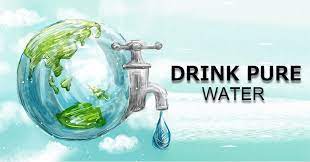You can’t live without clean drinking water. We use it to make drinks and prepare food. In short, we need potable water. The amount we need varies according to age, physical activity, environmental conditions, and other health-related factors. However, no matter what our age, gender, or health status is, we all need water. Whether it is available in a community or filtered from a nearby stream, clean drinking is essential for a good life.
In fact, water quality affects more than just our daily lives. Pollution in water supplies can cause disease. It can cause cholera, typhoid, and hepatitis A. It is therefore essential to ensure we have clean water. Regardless of where we live, we can all benefit from safe drinking water. Moreover, it’s not just important for your health; it’s a basic human right.
The EPA and the World Health Organization have developed drinking water standards for 90 contaminants and have found that more than ninety percent of U.S. communities meet the health-based standards. EPA also recently finalized regulatory determinations for two PFAS chemicals and is proposing to expand monitoring under the Safe Drinking Water Act. Despite the challenges and obstacles, the Obama administration’s commitment to clean drinking-water infrastructure is encouraging.
There are many important reasons why drinking clean water is so important. It is a fundamental human right. It helps us stay healthy and strong, and it contributes to the development of a nation. Ultimately, without clean water, we can’t be as productive as we could be. It is also a sign of a strong economy. With a healthy and thriving economy, clean drinking water is essential. The WHO estimates that 1.1 billion people worldwide consume contaminated water. The World Health Organization predicts that by 2050, half of the world’s population will live in water-stressed areas.
In rural areas, public water systems typically serve fewer than 10,000 people. Because rural communities are smaller, they have fewer users and must deal with aging infrastructure. Because of these unique challenges, it’s crucial that rural water systems prioritize clean drinking and sanitation. It also helps prevent a country’s population from degrading. If we don’t protect our planet, our citizens will be at risk for diseases. So, it’s imperative that we protect our precious natural resources.
Besides the benefits of clean drinking water, it is essential for the health and prosperity of our society. The quality of water is essential for hygiene and sanitation. A healthy economy will be able to produce more products and services. But if it doesn’t, then the economy will be slow. Even a healthy society has a healthier population. That’s why it’s critical to protect our environment. With proper protection and treatment, safe drinking-water supplies are vital to the health and prosperity of our societies.
Having access to clean drinking water is essential. It can help reduce your risk of developing diseases and improve your productivity. For example, water contains digestive enzymes, which are necessary for the healthy functioning of our bodies. In addition, water is essential to our digestion, so it is important to drink enough water. It also helps us digest our food. Similarly, contaminated waters in our bodies can cause diarrhea and viruses. Some of these health effects may not be obvious right away.
Keeping our water clean is vital for our health. Currently, 91% of Nepal’s population drinks water contaminated with E-coli. This can cause many diseases and bacterial infections. Thankfully, clean drinking water is becoming a common commodity for everyone, but the problem is still very widespread. While the government may be able to provide clean drinking and sanitation for some people, there are still countless communities that don’t have access to the safest, cheapest, or most accessible options.
Apart from providing clean drinking water, there are a number of other benefits of clean water. It helps our bodies to move food through our intestines, reducing the risk of constipation. Furthermore, contaminated water can cause gastrointestinal illnesses like diarrhea, and can carry viruses. While many of these effects may not be immediately apparent, they can lead to serious health problems. Further, the pollution of water can affect our overall well-being.


